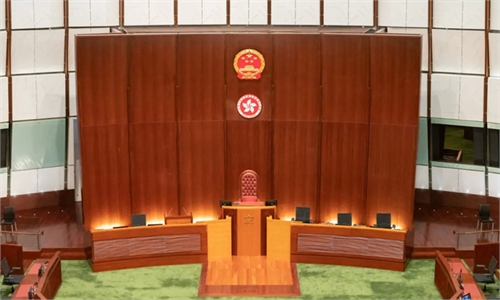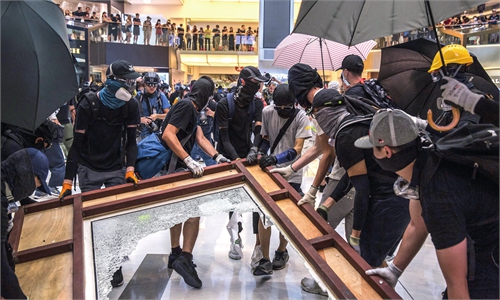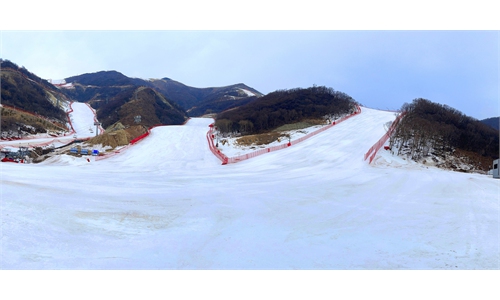Athletes, not Western politicians, are protagonists of Winter Olympics: Kenneth Fok Kai-kong, VP of Sports Federation and Olympic Committee of HK
Editor's note: Less than two weeks from the start of the Beijing 2022 Winter Olympic Games, the Global Times reporters Chen Qingqing and Fan Lingzhi (GT) interviewed Kenneth Fok Kai-kong, vice president of the Sports Federation and Olympic Committee of Hong Kong. As the husband of Chinese "diving queen" Guo Jingjing, Fok is also a lawmaker of the 7th-term LegCo. He has witnessed Beijing 2008 and expects the first and only city to host both the Summer and Winter Olympics to do so splendidly.
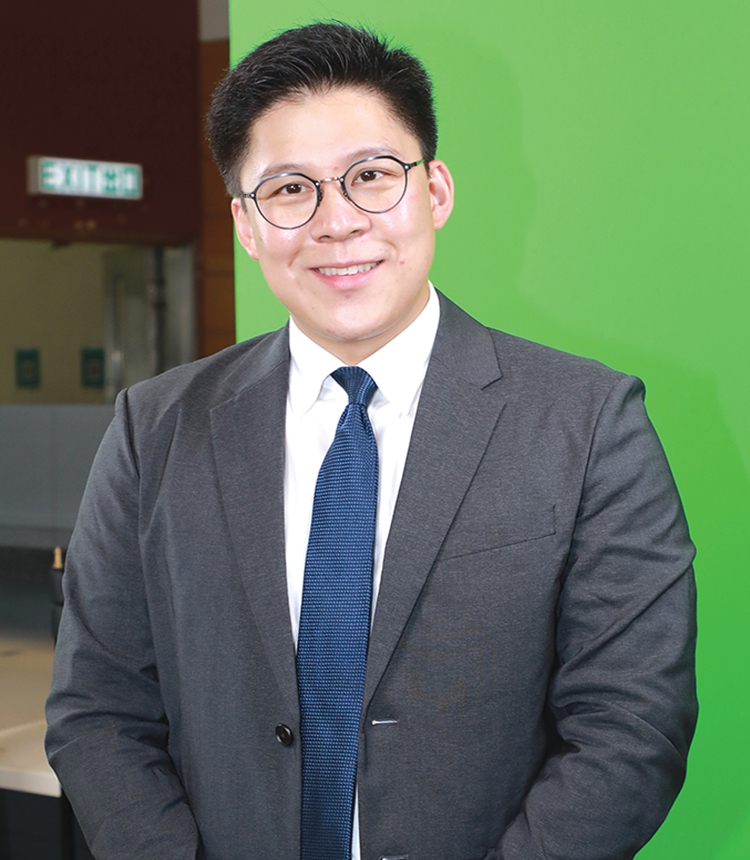
GT: Could you share with us your plan during the upcoming Beijing 2022 Winter Olympic Games, as you mentioned in previous interviews that you have had plans to come to Beijing to watch the Games with your wife and children. What's your schedule?
Fok: I've always looked forward to come to Beijing as I could not stop thinking about the moment when we held the Summer Olympics in 2008. I was in the Bird's Nest stadium in Beijing, and I felt so proud that our country could finally host the Olympics. This time, Beijing is hosting the Games again, becoming the first city in the world to hold both the Summer and Winter Olympics, which is a source of national pride that fully demonstrates city's and country's capabilities.
Regretfully, due to the COVID-19 epidemic, I can't go to Beijing to watch the Games. Also, the new term of the LegCo just began, and as a member of the LegCo, there is much work to do. As a freshman to the LegCo, I also have many things to familiarize myself with and will soon get down to the tasks at hand.
Both my wife and I feel regretful that we will not be able to attend the Games. As my wife comes from North China's Hebei, where the major venues are located, she feels that it's a pity indeed. But we'll closely follow the Games on TV, to cheer for our Hong Kong athletes and also for our national team.
GT: What's your favorite ice sport? And how do you see the level of popularization of ice sports in Hong Kong?
Fok: I like skiing. As I studied overseas, I had the chance to try different ice sports. And now my daughter has started to learn how to ski. I think the Winter Olympics have provided people with the chance to learn more about the ice sports. As spectators, we love watching figure skating with its aesthetic and rhythmic attraction.
I think Beijing hosting the Winter Olympics is very meaningful. As part of the Olympic family, I clearly remember the voting ceremony in Kuala Lumpur. When the Olympic committee was evaluating the city of Beijing, one of the most persuasive reasons behind their decision was the legacy left behind after hosting the Olympics there. It's a win-win for China.
By hosting the Winter Olympics, governments support the development of regional infrastructure and further tap into the ice sports market, which will help in advancing the overall sports industry growth and encourage public participation. For example, when I went to Europe and the US to ski few years ago, local coaches asked me whether we would host the Winter Olympics, which would also create new jobs.
China could hold world championships or tournaments in the near future. There currently is a winter games atmosphere in Hong Kong, for example in some shopping malls, we can see people participate in curling. I believe this interest will grow as more infrastructure in our country is constructed. In the future, local residents in Hong Kong will not need to go to South Korea or Europe, or Japan for skiing, but will simply visit different cities in our own country to enjoy the same high quality experience.
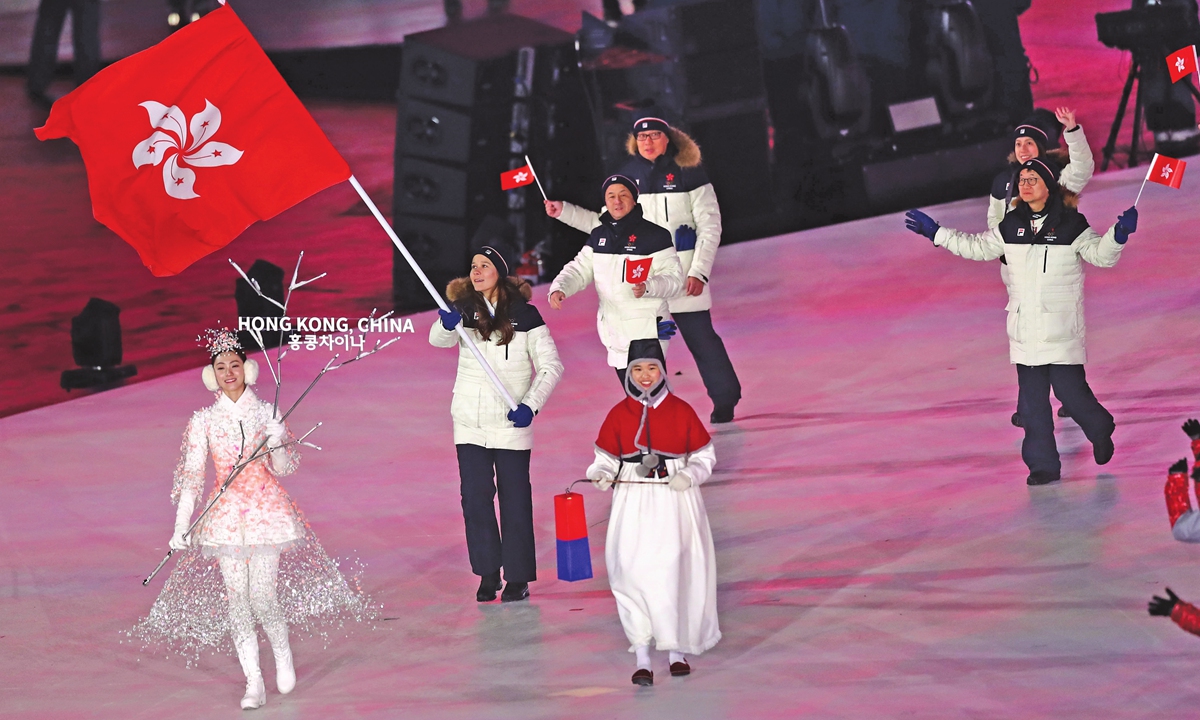
GT: Although many people like you are anticipating the Winter Olympics, there are certain countries calling for a so-called diplomatic boycott by not sending their officials to the Games. Also some media outlets have hyped alleged security issues. US authorities, for instance, suggested athletes to the Games should not bring their own phones to avoid "surveillance". How do you view such claims?
Fok: I feel deeply regretful and unhappy about such claims. We have advocated the principle of separating sports from politics. While China and the US have strained ties, some politicians, especially those in the US, are using the Olympics as a tool to steal the limelight, which is not something we would hope to see. The Games are about mutual respect and mutual understanding, finding friendship in the matches, and learning from each other no matter where respective participants are from.
At the closing ceremony of every round of Olympic Games, the chairman of the IOC first thanks the hosting city, then acknowledges the participating athletes, and volunteers. Let us not forget who the main character in the Games is - the athletes and volunteers. Without them, the Games can't be held. So politicians should not consider themselves an indispensable part of the event.
GT: However, we notice that even though the US called for a so-called diplomatic boycott, there are some US officials who have reportedly applied for visas to China to attend the Games. What does this seemingly incongruous action mean?
Fok: I think those calls only reflected their political intention. Many people are willing to join and are hoping to see Beijing successfully host the Games. That's the view of the majority.

GT: Hong Kong is sending three athletes, which is its largest-ever Olympic delegation, to the Winter Olympics this time. What's your expectation for them? And what does it mean for ice sports in Hong Kong, and will it resonate with young people there?
Fok: We are so proud of them, as there are not many athletes trained in Hong Kong that have reached Olympic proficiency standards, especially in alpine skiing, as we don't have snow-covered mountains in Hong Kong. So the two athletes have to train overseas, unable to spend time with their families and friends.
I hope their participation in the Winter Olympics in Beijing will inspire more young people in Hong Kong to focus on winter sports and inspire more to take part in them.
I hope that when our young people look at the sports development in our country, they will not only focus on the number of gold medals or elite athletes, but will truly consider what hosting the Olympic Games means for our country's development. Sport serves as a bridge to help people to understand each other. Sport actually serves as a non-official diplomatic function for our country to help the world to know China.
I remember in the Beijing 2008 closing ceremony, former IOC chief Jacques Rogge said the Beijing Olympics Games succeeded in facilitating understanding between China and the rest of the world.
For a period of time, Hong Kong suffered from chaos, and patriotism was suppressed for many reasons.
But when Cheung Ka-long won a gold medal in the Men's Foil Individual competition in the Tokyo 2020 Summer Olympics held in summer 2021, Hong Kong residents gathered at shopping malls and cheered for him and for Hong Kong table tennis player Doo Hoi Kem in front of giant screens, for which I was touched, and also saw a glimmer of hope.
This is also an opportunity for us to hold more activities and exchange programs, helping the Greater Bay Area work together in paving the way for the 15th National Games in 2025.
It's also an opportunity to put aside political agenda and bring young people together in sports exchanges, which will also help them know our country on the basis of mutual respect.
GT: Could you share with us one of your personal experiences in describing the changes that Hong Kong has gone through in recent two years?
Fok: Hong Kong has changed significantly in the past two years, as many friends and colleagues have described it as a "return to the motherland for the second time."
In the social turmoil and dark unrest in 2019, I felt unsafe, which I had never felt before despite having lived in Hong Kong for so many years, as the safety index of the city was always very high, and we never felt any threats to personal safety no matter how late we went out.
I remember at that time, some attacked people who spoke Putonghua for no reason, which was not the Hong Kong I was familiar with.
Since the national security law for Hong Kong and electoral reform took effect, we feel safe again. And I made up my mind to run for LegCo office, a decision I made amid the chaos then, hoping to contribute to the society and safeguard the city. At the same time, I was struggling to find a way to keep my family safe.
Not only me, but many other friends who hoped to run for the election, were in a nervous state. At that time, it was a question about whether we could safeguard the values of Hong Kong, safeguard the operations of the LegCo, and the HKSAR government, which were all under threat.
There was no room for negotiation in Hong Kong from 2012 to 2019. People antagonized each other, and had no willingness to listen to other people's opinions. Could we, in good conscience, call that democracy? It did no good for the city.
Now, 90 lawmakers from different backgrounds can sit down together, negotiate, and cooperate, no matter what parties or groups they are affiliated to. There's a peaceful and cooperative environment, which is suitable for Hong Kong and our nation. As the overall situation has been stabilized, we are confident in contributing to the city's growth. And I believe the next 10 to 20 years will be a very bright era for Hong Kong.
GT: What are some of the most urgent issues for the LegCo's 7th-term?
Fok: The biggest problem now is definitely the housing issue, which has not been solved for many years. I will not discuss it here, but we know that the central government is very concerned about it. For some issues that concern the vital interests of the common people, such as housing and transportation, we really need to listen to the voices of different grassroots friends. This is what we need to do in the future.
From my own functional constituency, local governance and policies must be considered in accordance with the central government's major policies, not just for Hong Kong. For example, sports culture. We need to look at the field of sports culture, what our national policies are and how Hong Kong trades on its advantages. In the past, the HKSAR government spent as much money as possible to organize as many activities as possible every year. However, in the future, our country's major policy will be to develop the cultural and sports industry, and not just to hold however many activities.
The country is moving fast. In five years, cultural industry in China may be upgraded to a new level. Hong Kong is hoping to play the role of an international bridge. How can we let the soft power of China's fine traditions be translated internationally? How can we fulfill this role? We can't just rely on a lot of activities. We ought to let our people understand what Chinese culture is and how to tell Chinese stories through our imagination and creativity.

Kenneth Fok Kai-kong
GT: Could you share with us your plan during the upcoming Beijing 2022 Winter Olympic Games, as you mentioned in previous interviews that you have had plans to come to Beijing to watch the Games with your wife and children. What's your schedule?
Fok: I've always looked forward to come to Beijing as I could not stop thinking about the moment when we held the Summer Olympics in 2008. I was in the Bird's Nest stadium in Beijing, and I felt so proud that our country could finally host the Olympics. This time, Beijing is hosting the Games again, becoming the first city in the world to hold both the Summer and Winter Olympics, which is a source of national pride that fully demonstrates city's and country's capabilities.
Regretfully, due to the COVID-19 epidemic, I can't go to Beijing to watch the Games. Also, the new term of the LegCo just began, and as a member of the LegCo, there is much work to do. As a freshman to the LegCo, I also have many things to familiarize myself with and will soon get down to the tasks at hand.
Both my wife and I feel regretful that we will not be able to attend the Games. As my wife comes from North China's Hebei, where the major venues are located, she feels that it's a pity indeed. But we'll closely follow the Games on TV, to cheer for our Hong Kong athletes and also for our national team.
GT: What's your favorite ice sport? And how do you see the level of popularization of ice sports in Hong Kong?
Fok: I like skiing. As I studied overseas, I had the chance to try different ice sports. And now my daughter has started to learn how to ski. I think the Winter Olympics have provided people with the chance to learn more about the ice sports. As spectators, we love watching figure skating with its aesthetic and rhythmic attraction.
I think Beijing hosting the Winter Olympics is very meaningful. As part of the Olympic family, I clearly remember the voting ceremony in Kuala Lumpur. When the Olympic committee was evaluating the city of Beijing, one of the most persuasive reasons behind their decision was the legacy left behind after hosting the Olympics there. It's a win-win for China.
By hosting the Winter Olympics, governments support the development of regional infrastructure and further tap into the ice sports market, which will help in advancing the overall sports industry growth and encourage public participation. For example, when I went to Europe and the US to ski few years ago, local coaches asked me whether we would host the Winter Olympics, which would also create new jobs.
China could hold world championships or tournaments in the near future. There currently is a winter games atmosphere in Hong Kong, for example in some shopping malls, we can see people participate in curling. I believe this interest will grow as more infrastructure in our country is constructed. In the future, local residents in Hong Kong will not need to go to South Korea or Europe, or Japan for skiing, but will simply visit different cities in our own country to enjoy the same high quality experience.

The Hong Kong Winter Olympic team enters the stadium during the Opening Ceremony of the PyeongChang 2018 Winter Olympic Games on February 9, 2018. Photo: VCG
GT: Although many people like you are anticipating the Winter Olympics, there are certain countries calling for a so-called diplomatic boycott by not sending their officials to the Games. Also some media outlets have hyped alleged security issues. US authorities, for instance, suggested athletes to the Games should not bring their own phones to avoid "surveillance". How do you view such claims?
Fok: I feel deeply regretful and unhappy about such claims. We have advocated the principle of separating sports from politics. While China and the US have strained ties, some politicians, especially those in the US, are using the Olympics as a tool to steal the limelight, which is not something we would hope to see. The Games are about mutual respect and mutual understanding, finding friendship in the matches, and learning from each other no matter where respective participants are from.
At the closing ceremony of every round of Olympic Games, the chairman of the IOC first thanks the hosting city, then acknowledges the participating athletes, and volunteers. Let us not forget who the main character in the Games is - the athletes and volunteers. Without them, the Games can't be held. So politicians should not consider themselves an indispensable part of the event.
GT: However, we notice that even though the US called for a so-called diplomatic boycott, there are some US officials who have reportedly applied for visas to China to attend the Games. What does this seemingly incongruous action mean?
Fok: I think those calls only reflected their political intention. Many people are willing to join and are hoping to see Beijing successfully host the Games. That's the view of the majority.

Kenneth Fok Kai-kong poses with actor Eric Tsang Chi-wai, his father Timothy Fok Tsun-ting and Sidney Chu, Hong Kong's speed skater, at the press conference for Winter Olympics on January 4, 2022. Photo: Xinhua
GT: Hong Kong is sending three athletes, which is its largest-ever Olympic delegation, to the Winter Olympics this time. What's your expectation for them? And what does it mean for ice sports in Hong Kong, and will it resonate with young people there?
Fok: We are so proud of them, as there are not many athletes trained in Hong Kong that have reached Olympic proficiency standards, especially in alpine skiing, as we don't have snow-covered mountains in Hong Kong. So the two athletes have to train overseas, unable to spend time with their families and friends.
I hope their participation in the Winter Olympics in Beijing will inspire more young people in Hong Kong to focus on winter sports and inspire more to take part in them.
I hope that when our young people look at the sports development in our country, they will not only focus on the number of gold medals or elite athletes, but will truly consider what hosting the Olympic Games means for our country's development. Sport serves as a bridge to help people to understand each other. Sport actually serves as a non-official diplomatic function for our country to help the world to know China.
I remember in the Beijing 2008 closing ceremony, former IOC chief Jacques Rogge said the Beijing Olympics Games succeeded in facilitating understanding between China and the rest of the world.
For a period of time, Hong Kong suffered from chaos, and patriotism was suppressed for many reasons.
But when Cheung Ka-long won a gold medal in the Men's Foil Individual competition in the Tokyo 2020 Summer Olympics held in summer 2021, Hong Kong residents gathered at shopping malls and cheered for him and for Hong Kong table tennis player Doo Hoi Kem in front of giant screens, for which I was touched, and also saw a glimmer of hope.
This is also an opportunity for us to hold more activities and exchange programs, helping the Greater Bay Area work together in paving the way for the 15th National Games in 2025.
It's also an opportunity to put aside political agenda and bring young people together in sports exchanges, which will also help them know our country on the basis of mutual respect.
GT: Could you share with us one of your personal experiences in describing the changes that Hong Kong has gone through in recent two years?
Fok: Hong Kong has changed significantly in the past two years, as many friends and colleagues have described it as a "return to the motherland for the second time."
In the social turmoil and dark unrest in 2019, I felt unsafe, which I had never felt before despite having lived in Hong Kong for so many years, as the safety index of the city was always very high, and we never felt any threats to personal safety no matter how late we went out.
I remember at that time, some attacked people who spoke Putonghua for no reason, which was not the Hong Kong I was familiar with.
Since the national security law for Hong Kong and electoral reform took effect, we feel safe again. And I made up my mind to run for LegCo office, a decision I made amid the chaos then, hoping to contribute to the society and safeguard the city. At the same time, I was struggling to find a way to keep my family safe.
Not only me, but many other friends who hoped to run for the election, were in a nervous state. At that time, it was a question about whether we could safeguard the values of Hong Kong, safeguard the operations of the LegCo, and the HKSAR government, which were all under threat.
There was no room for negotiation in Hong Kong from 2012 to 2019. People antagonized each other, and had no willingness to listen to other people's opinions. Could we, in good conscience, call that democracy? It did no good for the city.
Now, 90 lawmakers from different backgrounds can sit down together, negotiate, and cooperate, no matter what parties or groups they are affiliated to. There's a peaceful and cooperative environment, which is suitable for Hong Kong and our nation. As the overall situation has been stabilized, we are confident in contributing to the city's growth. And I believe the next 10 to 20 years will be a very bright era for Hong Kong.
GT: What are some of the most urgent issues for the LegCo's 7th-term?
Fok: The biggest problem now is definitely the housing issue, which has not been solved for many years. I will not discuss it here, but we know that the central government is very concerned about it. For some issues that concern the vital interests of the common people, such as housing and transportation, we really need to listen to the voices of different grassroots friends. This is what we need to do in the future.
From my own functional constituency, local governance and policies must be considered in accordance with the central government's major policies, not just for Hong Kong. For example, sports culture. We need to look at the field of sports culture, what our national policies are and how Hong Kong trades on its advantages. In the past, the HKSAR government spent as much money as possible to organize as many activities as possible every year. However, in the future, our country's major policy will be to develop the cultural and sports industry, and not just to hold however many activities.
The country is moving fast. In five years, cultural industry in China may be upgraded to a new level. Hong Kong is hoping to play the role of an international bridge. How can we let the soft power of China's fine traditions be translated internationally? How can we fulfill this role? We can't just rely on a lot of activities. We ought to let our people understand what Chinese culture is and how to tell Chinese stories through our imagination and creativity.

